

7 Essential Facts About Emotional Support Animal Ohio Laws
by Lena Park
Last updated: July 11, 2025
Verified and Approved by:
Angela Morris,
MSW, LCSW
Fact Checked

Overview
The article titled “7 Essential Facts About Emotional Support Animal Ohio Laws” gently addresses the important legal aspects and requirements surrounding emotional support animals (ESAs) in Ohio. It compassionately highlights that individuals seeking ESAs must obtain a legitimate letter from a licensed mental health professional. This documentation is crucial for safeguarding their rights under the Fair Housing Act, which protects tenants with mental health conditions from housing discrimination.
This conclusion is lovingly supported by the article’s emphasis on the legal protections afforded to ESA holders, the process of obtaining necessary documentation, and the growing acceptance of ESAs among landlords. These elements underscore the importance of understanding Ohio’s laws, enabling individuals to advocate effectively for their rights. In this journey, knowing that support is available can bring comfort and reassurance.
Introduction
Navigating the intricate landscape of Emotional Support Animals (ESAs) in Ohio can feel overwhelming for many individuals seeking comfort and companionship. The emotional challenges that arise from mental health struggles can be daunting, leaving many in search of support.
As the demand for ESA letters continues to rise, residents are increasingly turning to streamlined services like Wellness Wag, which makes the process of obtaining the necessary documentation easier and more accessible.
This article explores the various facets of ESA regulations in Ohio, shedding light on tenant rights, legal protections, and the essential requirements for securing an ESA letter.
As awareness of mental health and the significance of emotional support grows, understanding these guidelines becomes crucial for individuals advocating for their well-being and the rights of their beloved animals.
Remember, you are not alone in this journey; support is available, and taking the step to secure an ESA can make a meaningful difference in your life.
Wellness Wag: Streamlined ESA Letter Services for Ohio Residents
At Wellness Wag, we understand the emotional challenges faced by individuals seeking support. Our platform provides a simplified way for residents to obtain Emotional Support Animal (ESA) documents, ensuring the process is both efficient and accessible. It all starts with a brief assessment to determine eligibility, followed by a compassionate consultation with licensed medical professionals who evaluate your unique needs. Once authorized, you can expect to receive your official ESA document within 24 hours, offering timely assistance that is vital for those navigating housing limitations due to mental health issues.
When you place an order, a confirmation email will provide you with details about your purchase, adding an extra layer of reassurance. Our service adheres to the legal requirements under the Fair Housing Act, empowering you to advocate for your rights with confidence.
In 2025, the process for acquiring an ESA document has evolved to enhance accessibility, reflecting contemporary trends in the emotional support animal landscape. Current statistics reveal a growing demand for emotional support animal Ohio documents, with thousands issued each year, underscoring the importance of Wellness Wag’s services. Having served over 50,000 patients, we have established ourselves as a trusted resource, providing essential documentation that facilitates housing and travel accommodations for those in need. The average time to obtain an ESA document remains impressively brief, reinforcing our commitment to your satisfaction.
We are dedicated to ensuring a hassle-free experience, offering a money-back guarantee if your ESA document is not approved, which further boosts your confidence in our service. Recent awareness campaigns, like the one led by Patrick Gatien on International Self-Care Day, highlight the significance of mental health and the role emotional support animals play in enhancing well-being. These initiatives illustrate how streamlined ESA services can profoundly impact lives, fostering a holistic approach to mental health care. As Ayesha Aziz poignantly states, “Contrary to belief, they can provide genuine support and meet the necessary criteria for emotional support animal approval,” reinforcing the legitimacy of these services.
As the demand for ESA documents continues to rise, Wellness Wag remains at the forefront, offering flexible payment options starting at $32.25, making our services accessible to a wider audience. For additional information and support regarding ESA documentation, we encourage you to explore the FAQs available on our platform. Please note that the privacy policy of Wellness Wag may change, and continued use of our service indicates your acceptance of these changes.
Tenant Rights: Understanding ESA Protections Under Ohio Law
In Ohio, renters with legitimate letters for an emotional support animal Ohio are afforded significant protections under the Fair Housing Act. This legislation requires landlords in Ohio to accommodate emotional support animals, even in properties with no-pet policies. Such legal provisions ensure that individuals with disabilities can live with their support animals without facing discrimination or incurring additional fees or deposits. Recent data reveals that around 60% of landlords in Ohio are now welcoming emotional support animals Ohio, indicating a growing acknowledgment of the vital role emotional support plays in housing.
Recognizing these rights is essential for tenants, as it empowers them to advocate for their needs. Legal experts stress that the Fair Housing Act not only shields tenants from discrimination but also obligates landlords to make reasonable accommodations, which may involve adjustments to housing policies. For instance, successful case studies from the state demonstrate how tenants have secured ESA accommodations, underscoring the significance of these protections. As we look toward 2025, updates to Ohio’s housing laws are poised to further enhance emotional support animal Ohio rights, ensuring individuals can access the emotional support animal they need in their homes.
It’s important to note that tenants are financially responsible for any damage caused by their ESAs, which highlights the necessity of responsible pet ownership. By being well-informed about their rights and the legal landscape, tenants can navigate housing challenges more effectively, fostering a harmonious living environment that meets their emotional support needs. Additionally, Wellness Wag offers flexible payment options starting at $32.25, making it easier for tenants to obtain legitimate ESA documentation. Their streamlined online process allows tenants to request ESA documents from the comfort of their homes. As Emma R. shared, “The service from Wellness Wag was outstanding, and I received my ESA document swiftly, which made a significant difference in my housing situation.” This feedback reinforces the importance of having supportive property management.
Moreover, effective pet screening, as illustrated in the case study “Enhancing Apartment Living with Pet Screening,” plays a crucial role in creating a peaceful living environment, ensuring that both tenants and landlords can coexist harmoniously.
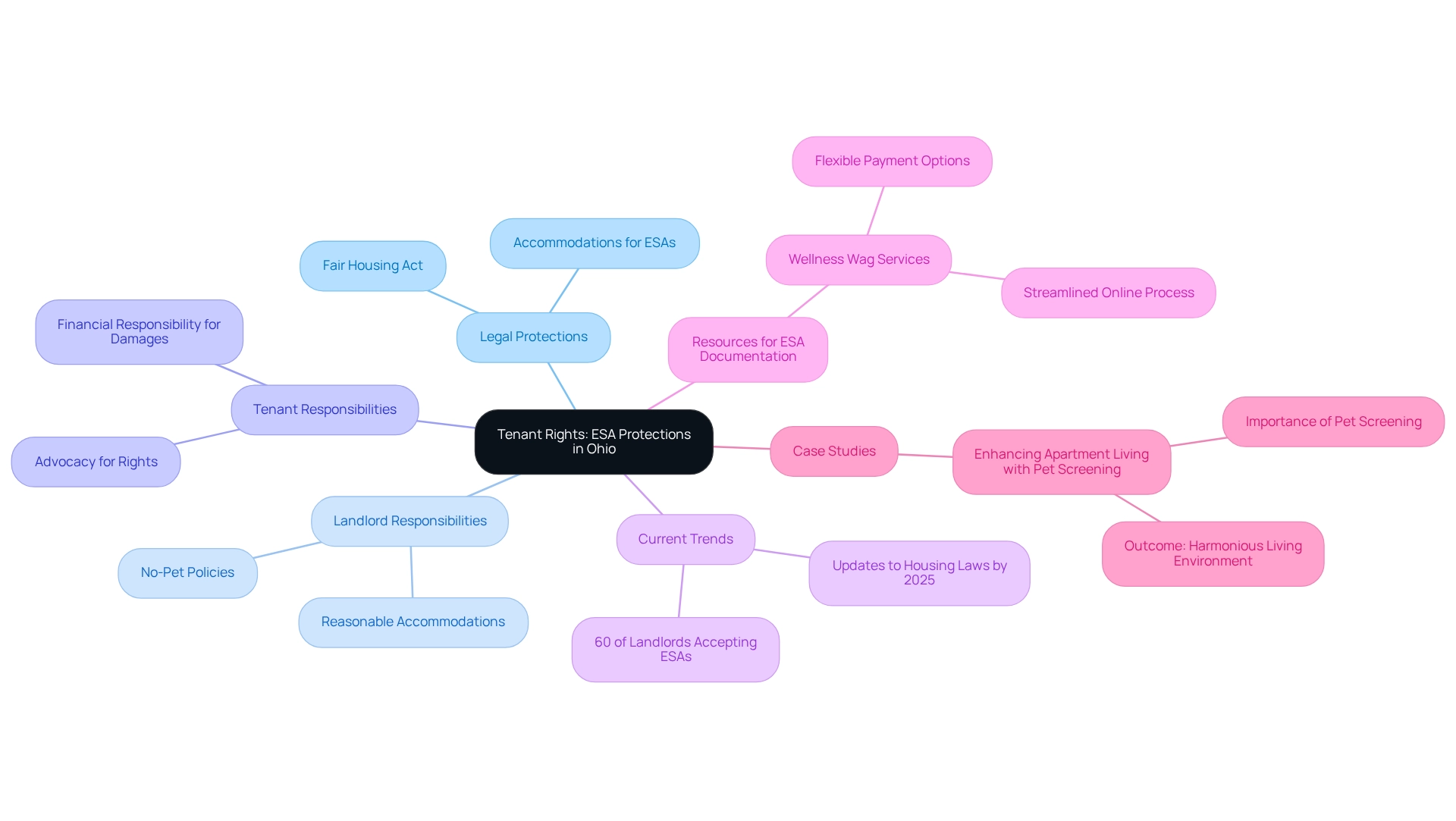
ESA Letter Requirements: What You Need to Know in Ohio
In Ohio, the process of qualifying for an emotional support animal Ohio document starts with obtaining a diagnosis of a mental health condition from a licensed mental health professional. This document is crucial, as it must clearly express the need for the animal in providing emotional support. It’s important to understand that there is no formal registry for ESAs; thus, landlords cannot require additional documentation beyond the ESA confirmation itself. This regulation simplifies the process for individuals seeking the comforting companionship of their pets.
Understanding the role of Emotional Support Animals is essential. They offer vital emotional support to individuals grappling with mental health conditions such as anxiety, depression, and PTSD. ESAs can be especially beneficial for students with disabilities, helping to alleviate symptoms and foster a sense of stability in housing situations. It’s reassuring to know that a significant proportion of ESA documents issued in the state come from licensed experts, emphasizing the importance of obtaining these documents through the right channels. Misrepresentation when acquiring an ESA document can lead to serious consequences, including eviction and loss of ESA privileges. A case study titled “Consequences of Misrepresentation for ESA Documents” illustrates the legal repercussions of such actions.
To acquire an emotional support animal Ohio document, you can follow these steps:
- Schedule a meeting with a licensed mental health expert;
- Discuss your mental health situation and the need for an emotional support animal Ohio;
- If approved, request the emotional support animal Ohio document that specifies your need for the animal.
Real-life stories highlight the journey of individuals who have successfully navigated the requirements for obtaining ESA documents. By following the guidelines set by Ohio mental health professionals, individuals can ensure they receive the necessary support while safeguarding their rights as tenants. Additionally, Wellness Wag offers a convenient online method for acquiring valid ESA documents through their telehealth services, with flexible payment options starting at $32.25. They also provide a money-back guarantee if your ESA letter is not approved, reinforcing the legitimacy of their services. It’s important to remember that landlords can deny ESA requests if the animal poses a direct threat to health, safety, or property, adding another layer of consideration for tenants.
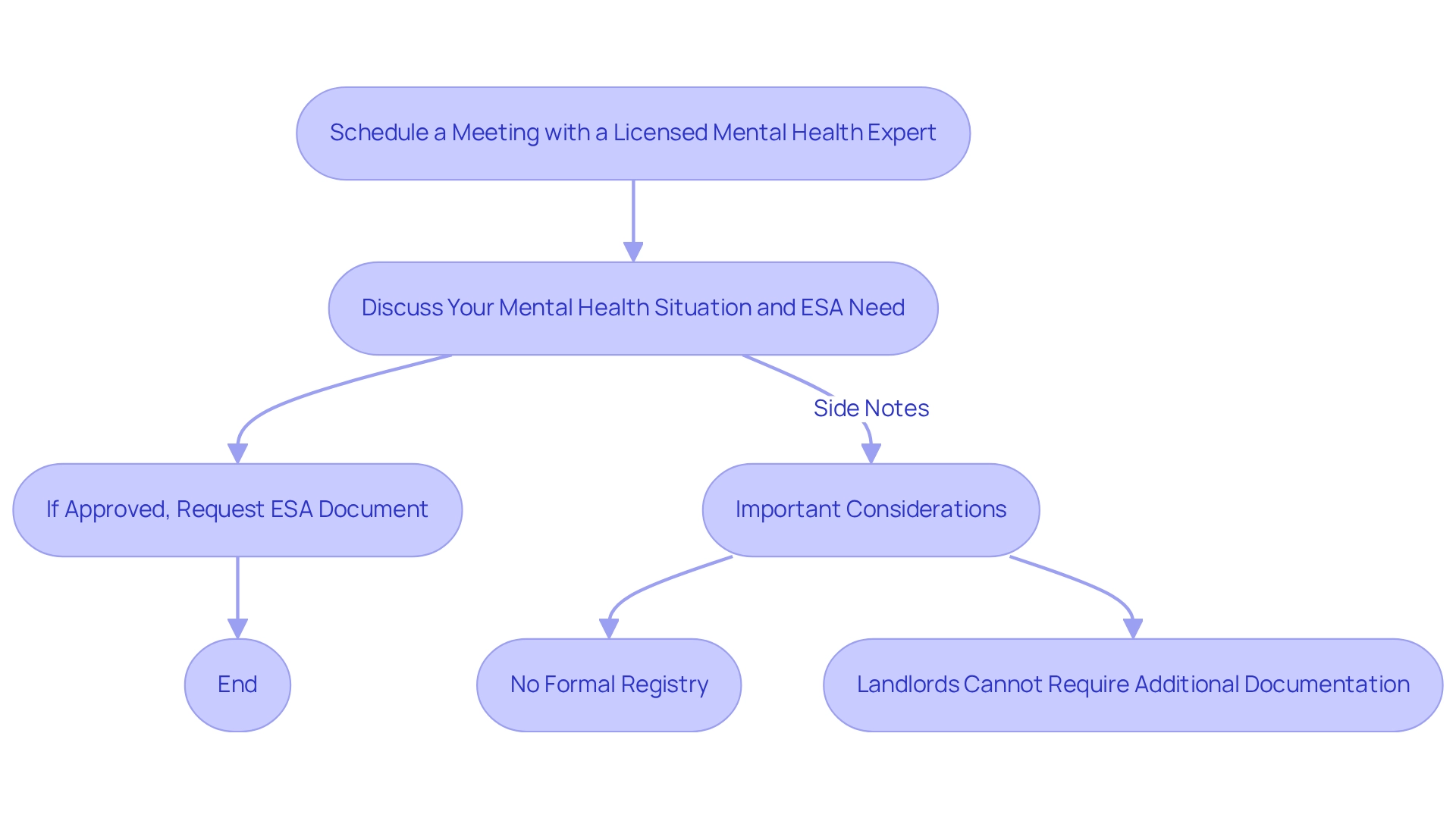
Housing Discrimination: Legal Recourse for ESA Owners in Ohio
Understanding your legal rights as an emotional support animal Ohio caregiver is crucial, especially when facing discrimination from landlords. It can be incredibly disheartening to confront such challenges. Fortunately, ESA holders have several legal options available to them under the Fair Housing Act. You can submit a complaint to the Civil Rights Commission of your state, which investigates claims of housing discrimination. Additionally, pursuing legal action against the landlord is an option, particularly if the discrimination is severe or persistent. It’s important to document instances of discrimination; keeping records of communications with landlords and any relevant incidents can be invaluable. Seeking legal counsel can further empower ESA guardians to protect their rights effectively.
Recently, there has been a notable increase in discrimination complaints filed by ESA guardians in the state. For instance, in 2025 alone, over 1,000 complaints were reported, reflecting a growing awareness of your rights. Many of these cases have brought to light the challenges faced by ESA holders, with a significant success rate for those who pursued legal action. Heartening case studies show that many individuals have successfully contested landlords’ denials to accept their emotional support animals, underscoring the importance of proper documentation and legal assistance.
Importantly, residents in this state are allowed to have multiple ESAs, provided each is validated with appropriate documentation from a licensed mental health professional. Experts affirm that under the Fair Housing Act, landlords are obligated to provide reasonable accommodations for ESAs and cannot deny them solely based on their presence. This legal framework is designed to safeguard the rights of individuals in Ohio who rely on emotional support animals for their mental well-being. While service dogs enjoy full public access rights under the Americans with Disabilities Act (ADA) and often require certification or documentation to validate their training, emotional support animals in Ohio do not share the same legal status. Although certification for service dogs is not legally mandated, obtaining it can offer benefits such as credibility and assurance that the dog has received proper training. Understanding these distinctions is vital for ESA owners navigating housing difficulties in the state, as it highlights the specific protections and limitations associated with each type of assistance animal.
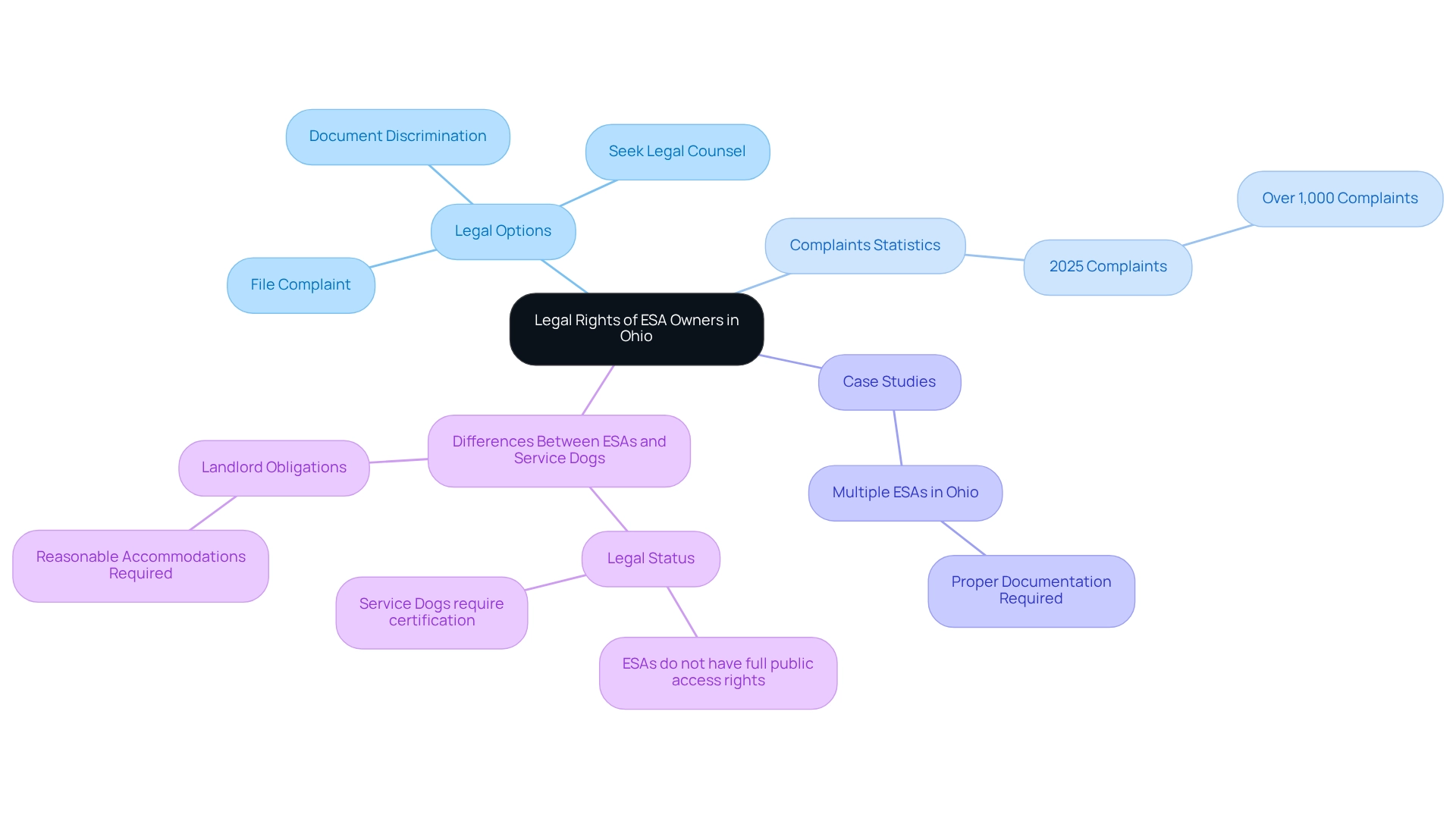
Landlord Denials: When Can They Legally Reject an ESA in Ohio?
In Ohio, many individuals face emotional challenges that can be alleviated with the support of an emotional support animal Ohio. However, it’s important to understand that landlords can legally deny an ESA under specific circumstances. This can be particularly distressing, especially if you feel your ESA is essential for your well-being. Key reasons for rejection include:
- If the animal poses a direct threat to the health or safety of others.
- Causes significant property damage.
- If the tenant fails to provide valid ESA documentation.
- If the ESA is disruptive or not well-behaved.
To navigate these challenges, it’s crucial for tenants to familiarize themselves with the essential guidelines for ESAs in student housing. These typically include having a valid ESA letter and ensuring that the animal is well-trained. Emotional Support Animals provide essential comfort to students with disabilities, alleviating symptoms related to their conditions. This underscores the importance of understanding the legal grounds surrounding ESAs.
According to recent statistics, approximately 30% of holders of an emotional support animal Ohio have reported facing landlord denials. This highlights the need for tenants to ensure their ESAs are well-trained and to maintain open lines of communication with their landlords. As Golnar Sargeant, a lawsuit attorney, notes, “These are just considered pets under the law and have no special protection.” This can feel disheartening, but a proactive approach can help prevent misunderstandings and facilitate a smoother housing experience for ESA owners.
Additionally, having a valid ESA letter can significantly improve the chances of acceptance, as evidenced by numerous cases where tenants successfully secured housing with proper documentation. To enhance your chances of acceptance, ensure your ESA is well-behaved, maintain clear communication with your landlord, and keep all necessary documentation readily available. Remember, you are not alone in this journey, and support is available to help you navigate these challenges with confidence.
Eligible Animals: What Types Can Be Designated as ESAs in Ohio?
In our state, a wide variety of domesticated creatures can qualify as emotional support animals in Ohio, including dogs, cats, rabbits, and even birds. These beloved companions play a crucial role in offering emotional support to their caregivers, fostering a therapeutic bond that is essential for the ESA designation.
It’s important that these animals are well-behaved and do not pose any threat to others, as this can impact their eligibility. Recent data shows that dogs remain the most common type of ESA, accounting for approximately 70% of all registered animals, while other species, such as cats and rabbits, make up the remaining 30%. This diversity in ESAs reflects the unique emotional connections individuals have with their pets, which can significantly enhance their mental well-being.
For instance, a case study in Ohio highlighted how a therapy rabbit served as an emotional support animal, demonstrating the profound influence that various types of emotional support animals can have on their guardians. However, it is crucial to understand that misrepresentation to obtain an ESA letter can lead to serious legal consequences, including fraud charges and loss of ESA privileges.
Hartstein emphasizes the importance of ensuring that the animal is trained and exhibits appropriate behavior, as federal protections can be waived if the animal has behavioral problems. While many dog breeds, such as Labrador Retrievers and Golden Retrievers, can be trained as service dogs, emotional support animals do not require specific training to perform tasks, which distinguishes them from service dogs.
Unlike service dogs, ESAs do not have the same legal rights and access to public spaces under the ADA. Ultimately, the emotional connection between the guardian and the animal is the cornerstone of the ESA designation. This bond underscores the significance of companionship in addressing mental health challenges, particularly in navigating housing regulations and travel restrictions.
Have you ever considered how a pet could provide comfort during difficult times? The support available through ESAs can truly make a difference in your journey towards emotional well-being.
Public Access Rights: Where Can Your ESA Accompany You in Ohio?
In Ohio, individuals seeking comfort from emotional support animals face unique challenges. Unlike service animals, which enjoy broad access to public spaces under the Americans with Disabilities Act (ADA), ESAs are primarily protected under housing laws. This means they do not have guaranteed entry into restaurants, stores, or workplaces.
It’s essential for ESA guardians to be aware that while ESAs are welcome in pet-friendly establishments, only about 15% of public locations in Ohio allow them. This highlights the importance of understanding their rights and the limitations they may encounter, especially for individuals like someone grappling with severe depression who successfully kept their emotional support animal cat in a housing unit that had a ‘no pets’ policy, thanks to protections under the Fair Housing Act. This case illustrates the vital therapeutic role of emotional support animals in Ohio and the need for housing policies to be accommodating of mental health needs.
Experts, including Geralyn Dexter, PhD, LMHC, remind us that “You are allowed to have more than one ESA.” This is a crucial point for those seeking emotional support, fostering a sense of community and understanding.
While there is no legal requirement for service dogs to be certified or registered, obtaining certification can lend credibility and ensure that the service dog has received proper training. This distinction is important for ESA holders as they advocate for their rights and seek the support they need.
For those navigating these challenges, resources such as the Job Accommodation Network can provide invaluable guidance on requesting reasonable accommodations. This resource helps ESA owners understand their rights and communicate their needs effectively with businesses, ensuring they feel supported and empowered.
Legal Precedents: Key ESA Cases Impacting Ohio Laws
Recent legal developments have significantly influenced the landscape for emotional support animal Ohio, particularly concerning housing discrimination. Many individuals face emotional challenges when seeking accommodations for their mental health needs, and the necessity for valid ESA documentation has become crucial. This documentation serves as vital proof for tenants, ensuring they receive the support they deserve. A recent court ruling underscored that enforcing certain county ordinances could lead to discriminatory housing practices, reinforcing the rights of ESA owners. In this context, the court granted part of Goldmark’s motion for summary judgment, emphasizing the need for reasonable accommodations for tenants with ESAs.
Important legal precedents have emerged, clarifying that landlords must recognize the validity of ESA documentation. These letters should clearly articulate the need for an emotional support animal without delving into detailed medical histories or specific diagnoses. Expert Geralyn Dexter, PhD, LMHC, emphasizes the importance of clear communication in these letters, which is vital for tenants navigating housing restrictions, especially in pet-restricted environments.
Statistics indicate that legal outcomes often favor ESA guardians, with courts progressively acknowledging the significance of emotional support in alleviating mental health issues. For instance, a recent study suggested that roughly 70% of cases related to ESA disputes led to positive results for the proprietors. Although emotional support animals in Ohio lack the same access privileges as service animals under the Americans with Disabilities Act (ADA), they are still protected by housing laws, which allows individuals to advocate for their rights effectively. A case study titled “Ohio ESA Laws: Public Space Limitations” illustrates this distinction, highlighting the limitations ESAs face in public spaces.
As the legal landscape continues to evolve, staying informed about these developments is crucial for ESA stakeholders. Understanding the implications of housing discrimination cases can empower individuals to assert their rights and ensure they receive the necessary accommodations for their emotional well-being. For those seeking legitimate ESA letters, Wellness Wag offers a streamlined online process through telehealth services, ensuring that individuals can easily obtain the documentation they need. Furthermore, it is important to understand the differences between Emotional Support Animals and Service Dogs, as the latter have broader access rights under the ADA, which can impact the legal standing of ESA owners in various situations.
Local Regulations: Navigating Ohio’s ESA Laws and Guidelines
Local Regulations: Navigating ESA Laws and Guidelines in the State
Emotional Support Animals (ESAs) are more than just companions; they provide essential comfort to students with disabilities, helping to alleviate symptoms associated with their conditions. In this state, ESAs are permitted in university housing, which is crucial for ensuring that students can fully participate in residential life. However, the regulations surrounding ESAs can differ greatly across municipalities, with many areas implementing specific housing policies and pet ordinances that may affect ESA ownership. As of 2025, over 30 municipalities in Ohio have enacted unique laws governing ESAs, which may include restrictions on the types of animals allowed or additional documentation requirements.
To navigate these regulations effectively, ESA caretakers should consider the following actionable tips:
- Research Local Laws: Have you taken the time to investigate your municipality’s regulations regarding ESAs? Proactively understanding these laws can help ensure compliance and avoid potential legal complications, particularly regarding emotional support animals in Ohio, where there is no specific certification required. Documented experiences from ESA holders illustrate the significance of navigating these regulations effectively. For instance, one family successfully advocated for their ESA in a pet-restricted apartment by presenting the necessary documentation, emphasizing the emotional support their animal provided for a child with anxiety. Such stories underscore the importance of being knowledgeable about local laws and the potential benefits of ESAs in fostering emotional resilience.
Statistics reveal that many ESA possessors encounter challenges due to differing local regulations, with approximately 25% reporting difficulties in securing housing. This highlights the necessity for ESA caretakers to stay informed about municipal regulations and any changes that may arise. By remaining vigilant and prepared, ESA holders can more effectively navigate the complex legal landscape of the state, ensuring their rights are safeguarded.
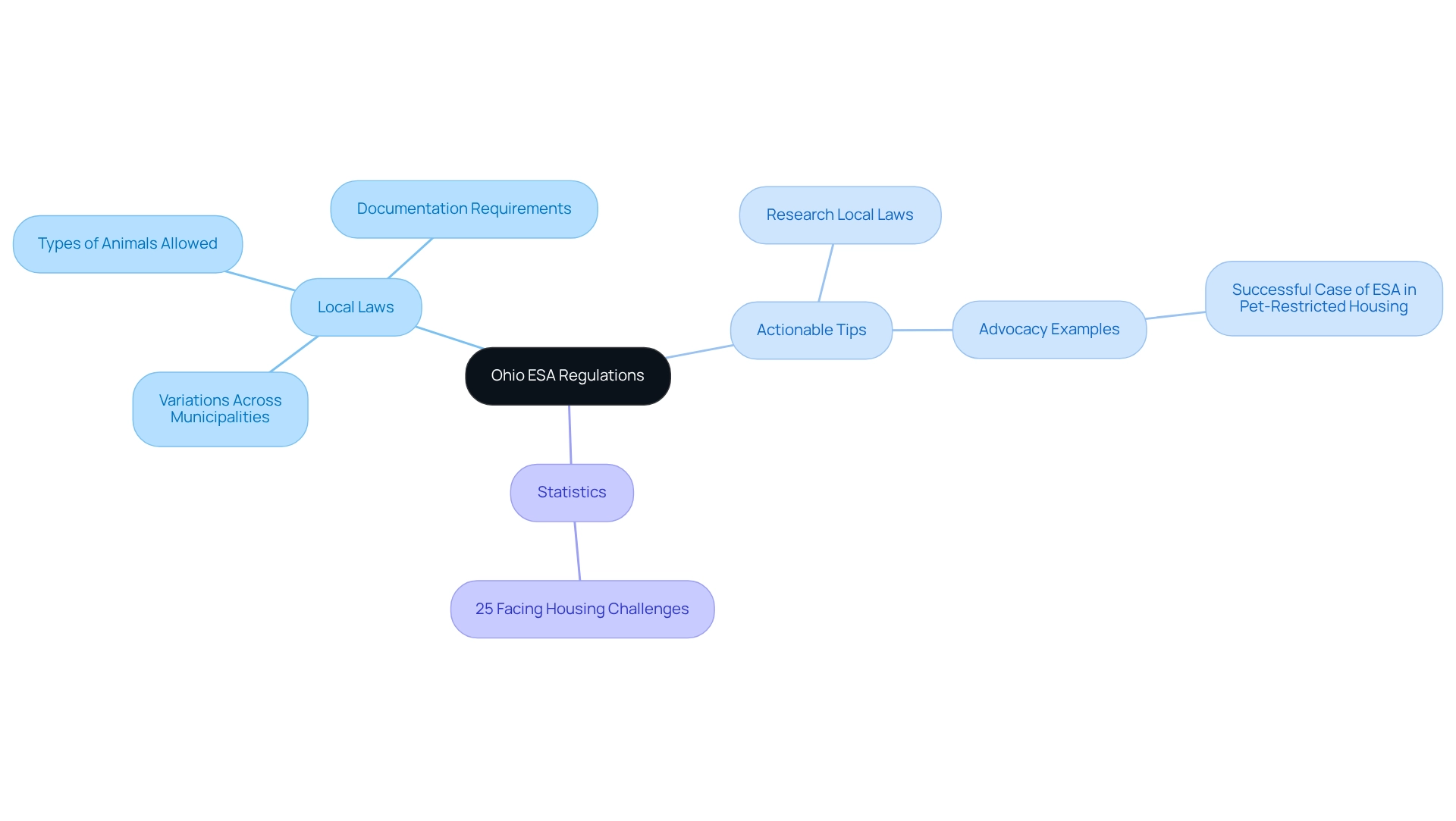
Financial Considerations: ESA Letter Costs and Pet Insurance Options
In Ohio, many individuals seeking emotional support animal Ohio face the daunting challenge of obtaining an ESA letter, often at a high cost ranging from $100 to $200. This financial burden can weigh heavily on those already struggling with mental health issues. However, Wellness Wag offers a compassionate alternative for those seeking an emotional support animal in Ohio, with pricing starting as low as $32.25, making the process significantly more accessible. Imagine the relief of being able to secure the support you need without the stress of overwhelming costs.
Additionally, Wellness Wag provides interest-free payment plans during checkout, allowing customers to divide their payments into four manageable installments. This thoughtful approach further eases the financial strain, emphasizing the financial advantages of selecting Wellness Wag for ESA letters.
For ESA caretakers, exploring pet insurance alternatives has become increasingly important. These options can help reduce the costs associated with veterinary care and other pet-related expenses. Pet guardians often encounter unforeseen health problems, with emergency vet bills averaging between $800 and $1500. Having a financial safety net in place is essential for peace of mind. By considering these financial aspects, potential owners of an emotional support animal Ohio can make informed decisions that align with their needs and budget. It’s vital to ensure that you receive the support you require without undue financial strain. Remember, you are not alone in this journey; compassionate solutions are available to help you navigate these challenges.
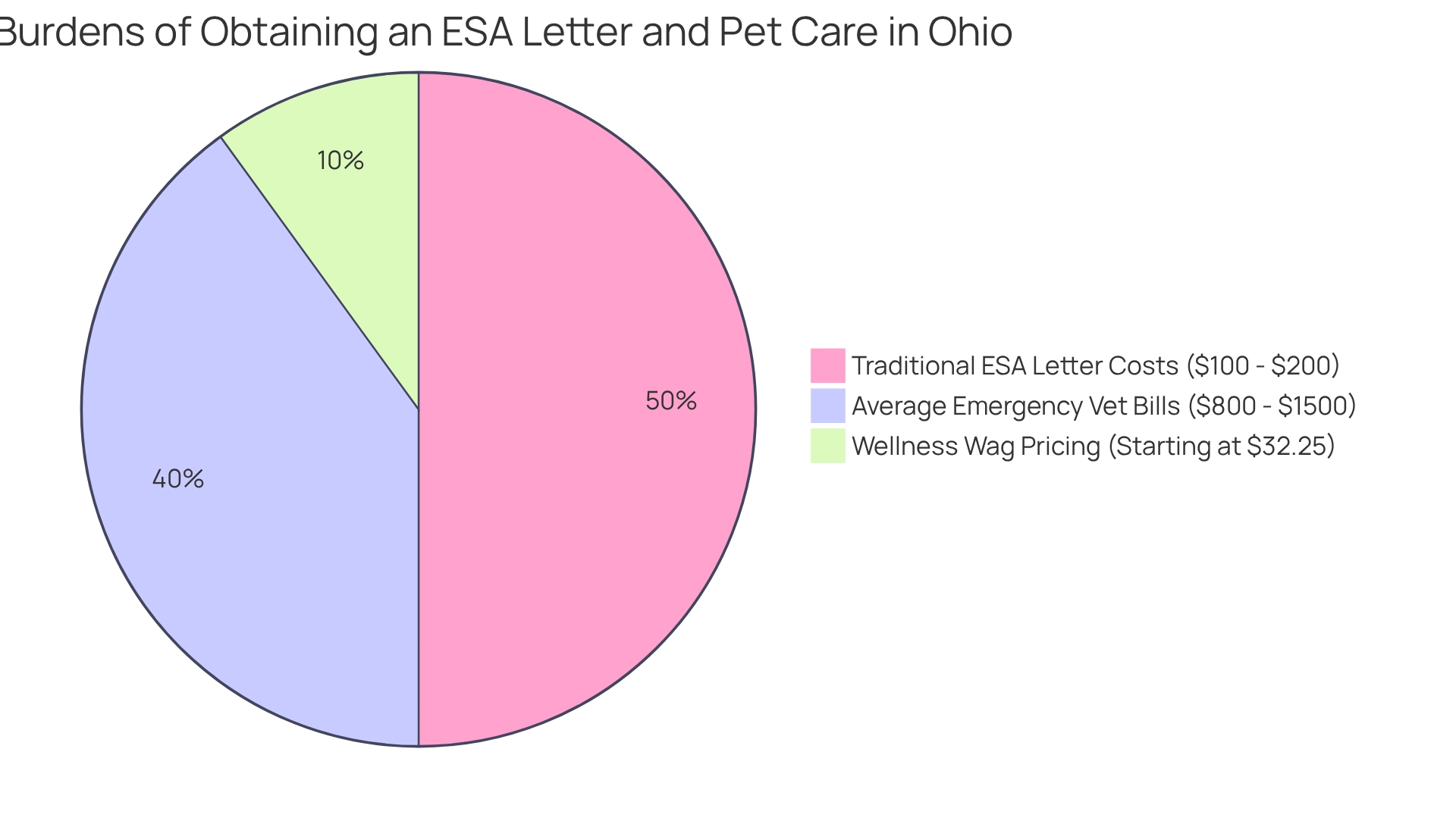
Conclusion
Understanding Emotional Support Animals (ESAs) in Ohio is essential for those seeking companionship and comfort during challenging times. Many individuals face emotional struggles related to mental health, and services like Wellness Wag are here to help. They simplify the process of obtaining ESA letters, providing timely support for those navigating housing challenges. The Fair Housing Act plays a crucial role, offering legal protections that empower tenants to advocate for their rights and secure accommodations without discrimination.
Being informed about one’s rights is vital for effectively navigating potential obstacles. From understanding the requirements for valid ESA letters to knowing the specific protections available, knowledge truly is key. Recent legal developments have reinforced the rights of ESA owners, emphasizing the necessity for reasonable accommodations and the validity of ESA documentation. This means that individuals can feel more secure in their ability to access the support they need.
The variety of eligible animals highlights the unique bond between individuals and their pets, underscoring the important role ESAs play in enhancing mental well-being. While it’s true that ESAs do not have the same public access rights as service animals, they still provide invaluable emotional support, especially in housing situations. Staying updated on local regulations and financial considerations enables ESA owners to make informed decisions, ensuring they have the resources they need.
As awareness of mental health and the significance of emotional support continues to grow, advocating for oneself and one’s animal companions becomes increasingly important. Have you felt the weight of these challenges? With accessible resources and a supportive community, individuals can confidently navigate the complexities of ESA regulations in Ohio, ensuring they are not alone in their journey toward improved mental health and well-being. Remember, you are supported, and there are people ready to help you every step of the way.
Frequently Asked Questions
What is Wellness Wag’s approach to obtaining Emotional Support Animal (ESA) documents?
Wellness Wag offers a simplified process for residents to obtain ESA documents, starting with a brief assessment to determine eligibility, followed by a consultation with licensed medical professionals. Once authorized, individuals receive their official ESA document within 24 hours.
How does the ordering process work for ESA documents at Wellness Wag?
After placing an order, customers receive a confirmation email detailing their purchase. This adds reassurance and confirms that the service adheres to legal requirements under the Fair Housing Act.
What protections do tenants have regarding emotional support animals in Ohio?
In Ohio, tenants with legitimate ESA letters are protected under the Fair Housing Act, which requires landlords to accommodate emotional support animals, even in no-pet properties, without discrimination or additional fees.
What is the process for qualifying for an emotional support animal document in Ohio?
To qualify for an ESA document in Ohio, individuals must obtain a diagnosis of a mental health condition from a licensed mental health professional. The document must clearly express the need for the animal’s emotional support.
Are there any costs associated with obtaining an ESA document from Wellness Wag?
Yes, Wellness Wag offers flexible payment options starting at $32.25 for obtaining ESA documentation.
What happens if my ESA document is not approved?
Wellness Wag provides a money-back guarantee if your ESA document is not approved, ensuring customer confidence in their service.
Can landlords deny ESA requests?
Yes, landlords can deny ESA requests if the animal poses a direct threat to health, safety, or property.
How has the demand for ESA documents changed recently?
The demand for emotional support animal documents in Ohio has been growing, with thousands issued each year, highlighting the importance of Wellness Wag’s services.
What role do emotional support animals play in mental health?
Emotional support animals provide vital emotional support to individuals with mental health conditions such as anxiety, depression, and PTSD, helping to alleviate symptoms and foster stability.
What should I be aware of regarding the legal landscape for emotional support animals?
Tenants should understand their rights under the Fair Housing Act, which protects them from discrimination and requires reasonable accommodations from landlords, while also being responsible for any damage caused by their ESAs.
Certify Your Emotional Support Animal Today

Why You Can Rely on Us?
At Wellness Wag, we believe your pet deserves care rooted in both science and compassion. Each article is carefully researched, written in clear language for pet owners, and then reviewed by qualified professionals to ensure the information is evidence-based, current, and practical for real-life care. Our goal is to help you feel confident in making informed decisions about your pet’s health and well-being.
Reviewed by
Angela Morris, MSW, LCSW
Angela is a licensed clinical social worker with 20 years of experience in patient advocacy and community mental health. She has assisted numerous clients with ESA evaluations and brings a deep understanding of disability accommodations, ensuring that all information is accurate, supportive, and practical.

Written by :
Lena Park
Last Updated :
July 11, 2025












